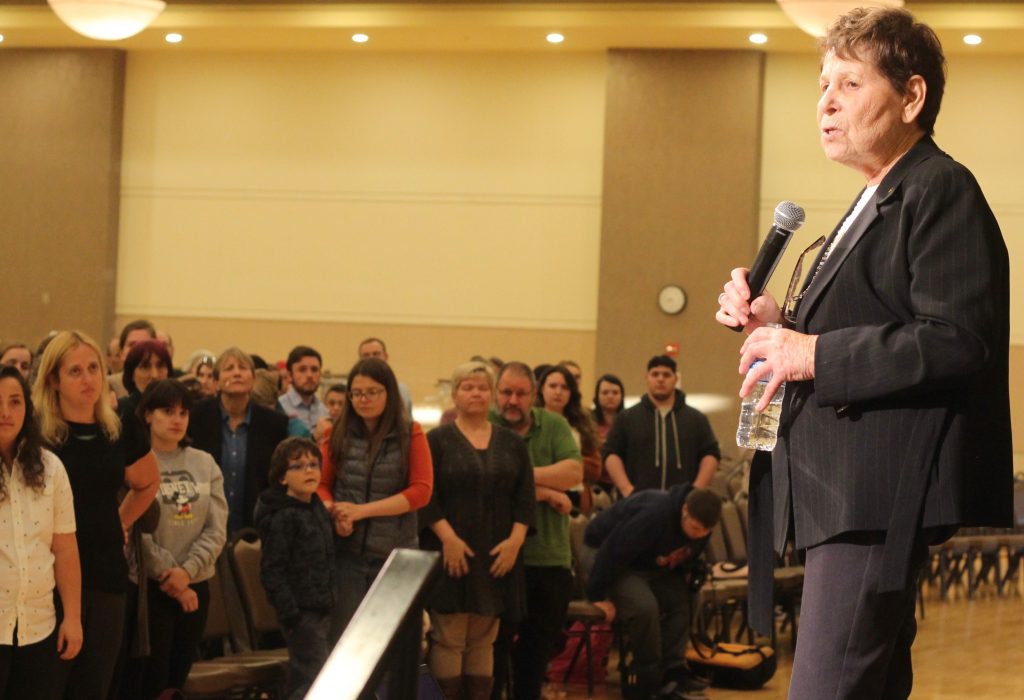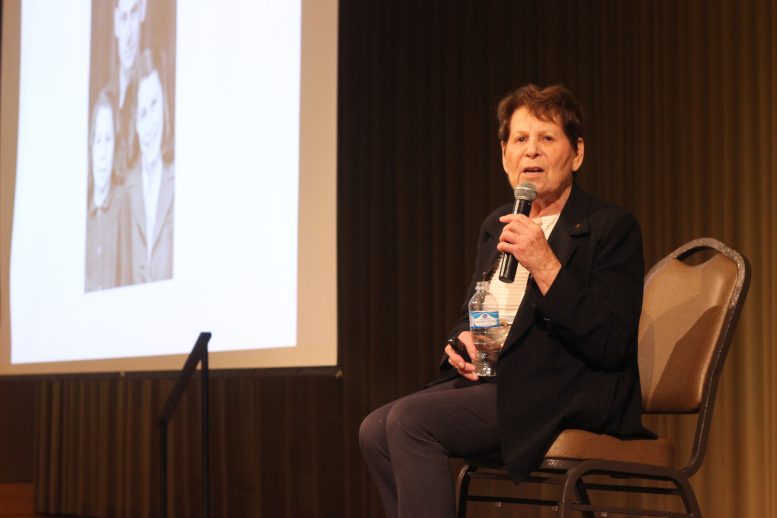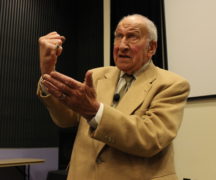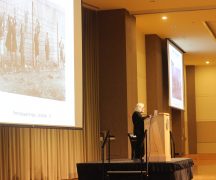By DAVID DUPONT
BG Independent News
After taking a few sips from her water, Erna (Blitzer) Gorman, ever the grandmother, told her audience, “I wish had a bottle for each of you.”
Then, she added, if anyone was feeling parched, “the bottle’s there.”
“I’m healthy,” she said, drawing a laugh from those gathered in the ballroom of Bowen-Thompson Student Union Monday evening.
Then the Holocaust survivor explained why she made jokes, even as she told of the horrors she and her family and other Jews endured. That helped her tell the story. Inside, Gorman said, her stomach was in knots.
Hers is a story that needs to be told. Asked later how to deal with those who questioned whether the Holocaust happened, Gorman said, to respond that they had heard her story.
This was the seventh year the Bowling Green State University Hillel had brought a Holocaust survivor to speak on campus.
Rachel Feldman, Hillel cultural chair, said that the Jewish organization would continue to do so as long as there are survivors to speak.
Gorman, now 85 — though she claims 29 — was only a child in 1939 when she, her parents and her older sister, Suzanne, left Metz, France, near the German and Luxembourg borders to join her father’s family in Poland.
That was a large extended family, led by a pious patriarch. When Hitler broke his pledge and invaded Poland, Gorman’s family headed east to Ukraine to join her mother’s parents.
Gorman remembers her grandmother as a tiny woman in a white apron who baked bread.
And she had “a pudgy grandfather” who would hold her in his arms.

“My parents were aloof,” she said. “They did not have time to cuddle. They just said ‘obey.’ They didn’t have time for anything else.”
A German officer, known for his hatred of Jews, arrived in Monastyriska. The Jews were pushed out to a ghetto. Those that survived the disease and hunger were pushed to another ghetto.
One day Gorman’s father and all other able-bodied men were rounded up and sent into the forest where they dug a mass grave. Jews from the ghetto, including Gorman’s grandparents, were rounded up brought into the forest, told to strip and then shot, one by one.
The able bodied men were told to bury them up.
When her father returned, Gorman said, she heard him tell her mother about her parents’ fate. She recalls her mother’s tears as her parents quietly recited the prayer for the dead.
Gorman said even now when she sees photographs of fields in Ukraine and Poland in full bloom, “I think to myself if you dig far enough someone would find my grandfather’s grave.”
The survivors in the ghetto were moved to another place. There Gorman’s family had a corner spot in a house on the ground floor. They pulled up the floor boards, and dug into the dirt below.
They dug out a space just large enough for the four of them to hide.
One night they heard screams and shots. The Germans and “local thugs who were more than happy to help” were rousing the inhabitants forcing them out, killing some on the spot.
The four members of her family hid below the floor. It was, she said, like being buried alive. “I knew, as young as I was, I would die if I cried out.”
Gorman said she’s uncertain how the next crucial step of the story occurred. But a local Christian farmer rescued them — “he’s an angel” — and hid them in a loft in a barn on his property. There, with just a blanket hidden among the bales of hay, they stayed for a period that may have been as long as two years — that’s what her sister remembers.
Every day the farmer climbed up to them with three buckets. One with water, one to use “for elimination purposes,” and the other with what small amount of food he could spare.
He didn’t tell his children they were there for fear they would tell a playmate. If Germans discovered them, they would kill them all. There was a reward, a sack of flour or sugar, for anyone who turned in a Jew.
All Gorman’s family could do was spend the day cleaning each other and their clothes, the same set they wore for the entire time. Gorman cannot go to a zoo and see apes grooming each other without thinking of her family in that barn.They suffered from lice and other vermin.
At times, Gorman recalled, the farmer would ask them to leave. But her mother would beg him to let them stay. Then the war turned, and the Red Army was approaching, and the farmer insisted they flee.
“When we left that horrific place, I was no longer a human being. Neither were my parents. … We were more like animals.” Suffering such extreme deprivations, they had lost their “inner beings.”
Their limbs, she said, had atrophied. The farmer had to carry them down. She remembers him tossing her over her shoulder.
They crawled away.
They came upon the Soviet Army battling the Germans. They followed the army. Sometimes the soldiers would carry Gorman and tend as they could to the lesions on her body.
Her mother was wounded in an air raid. They brought her to a local infirmary. She was, Gorman said, the only Jewish woman ever treated in that hospital, and though the staff bandaged her, they ignored her as her family watched her die.
They buried her nearby and left. Finally the family connected with the Red Cross and found care, and found their way back to France.
Gorman and her father eventually moved to Detroit where he worked for Ford and she worked as a clerk.
Gorman married, had two sons, and kept her story to herself for 40 years. She only told her husband that she was saved because her family hid. She never told her sons anything. She did teach them not to hate. She didn’t want them to hate even those who robbed her of her childhood.
Then 27 years ago she was watching a cable television show about skinheads. They had Nazi symbols and a photo of Hitler in the background. One of them said they had come to complete Hitler’s work.
This drove Gorman into a deep depression. She sought medical health, and her doctor urged her to tape her story.
Her family learned about her and her family’s ordeal by listening to her tape.
“I really don’t want you to feel any pity for me,” Gorman told the BGSU audience. “I’m the lucky one. I’m the one who survived.”
Instead she urged them to focus on the flowers or whatever brings them joy. And, if they have “pudgy” grandparents of their own, to give them a hug for her.





